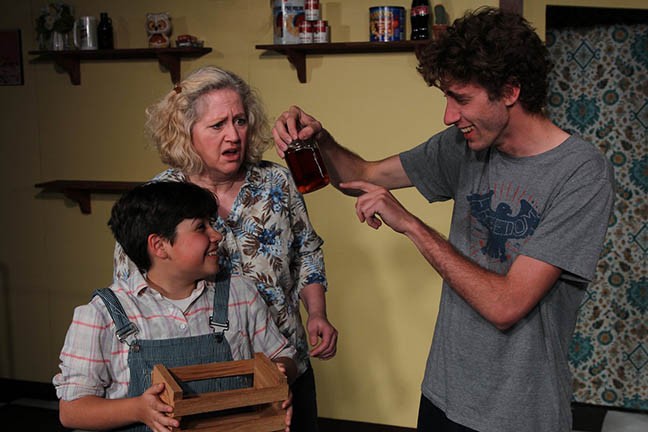In the recent Live Theater Workshop production of Appropriate, written by Branden Jacob-Jenkins, the audience is presented with a plethora of things to tackle. There is the colossal theme of racism accompanied by the more convoluted concepts of tradition and legacy, which all have much to do with learned behaviors. A family's shared history weaves together to create patchwork narratives that often lean towards certain bias and while viewing Appropriate, we peek into a particular family's prejudice. We witness the repeated cycles of pain, defensiveness, and rivalry.
Originally premiering in 2013, this play is confrontational even for our explicit era. It highlights the way a family romanticizes the structure of someone once they've passed on; how we forget their obstinate qualities and block out idiosyncrasies; how we don't view someone as racist if we're cut from the same cloth. This is distinctly performed by the oldest sibling, Toni (Rhonda Hallquist), who vacillates between rage and resentment. Each of her cathartic episodes seem to embolden a further slide into dysfunction. And while it feels that Toni's grief dominates the play there are two other essential points to note: The entire play takes place in an old plantation house and the playwright is African American.
Why important? Well, the word plantation is a trigger for many American citizens. As it should be. The historically white-owned, black-slave-operated plantation has served as a poignant allegory in dissecting the complexities of race relations in this country. It is an appropriately loaded metaphor that warrants sensitive treatment. Thus, the significance of it as a setting and Jacob-Jenkins being African American cannot be overstated. If he weren't, many scenes would feel intolerable. I felt particularly uneasy during some key moments, such as when the entirely white audience laughed at the all-white cast when they were Googling how much photos of dead black people go for on the Internet. Didn't seem right...and that's the point, I think? Through this discomfort, Jacob-Jenkins successfully reminds us that there are certain concepts that need to be represented by certain people.
The playwright unfolds the forced reunion of the Lafayette family, whose shifting unification over what to do with their late father's derelict property highlights the tense bonds keeping them tethered to one another. Frank (Cliff Madison) is the youngest sibling who serves as the crux for the entire family's disappointment. After a 10-year absence, he and his fiancée, River (Emily Gates), arrive in the night, crawling through the living-room window amongst the resonant chorus of cicadas. Their entrance disrupts everyone, setting the tone for the remaining two hours: someone will always be disrupted.
As is often the case in Naturalism, the characters of Appropriate are victims of their own circumstance. Often, characters in this genre seem outlandishly honest, as is the case here. The family is portrayed in such exaggerated forms that they become caricatures. Toni seems to exude such violent martyrdom that one wonders if she has any other personality traits. Her anguish is intriguing, even funny at first, but becomes predictable. To this point, some monologues stretch on like therapy sessions in which the characters explain everything ad nauseam, giving the whole thing an absurd undertone.
Conversely, well-placed curse words and overlapping speech create an oddly pleasing discordance. Two characters in particular are well developed: Bo (Keith Wick) and his daughter Cassidy (Ella James). Wick portrays Bo with sharp wit, an arrogant big city guy with layers unlike his kinfolk. James performs Cassidy as curious but bored of the world in a pre-teen way. She is probably the most dimensional character of the play.
The content is provocative and the diatribe entertaining, but something is amiss. It feels like the play never ends; drags where it could end with a punch (maybe even literally). The last scene finally translates some bizarre and spooky design elements that, had they been present earlier, would have cultivated the performance as a whole. Perhaps this ineffable discomfort is intentional though, as this play is an exploration in agitation. Whether alluding to lynchings, showcasing white-hooded children, or a WWE-style family feud, it essentially boils down to this: birth families can be crummy. While reconciling their realities in the wake of their father's death this family inadvertently shows us how to be, or not to be, appropriate.
For more local theater coverage, visit tamingofthereview.com.









